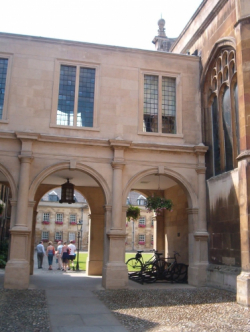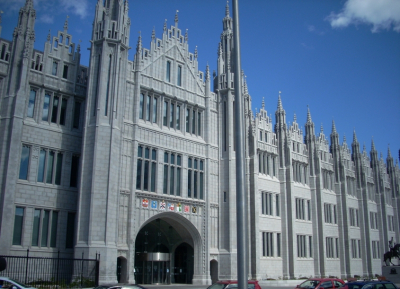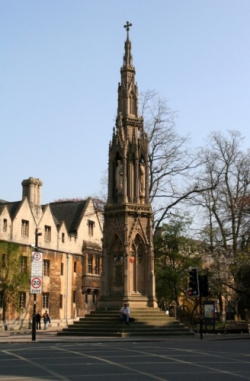Bedivere Hall
Apud antiquissimos et de navitas et potestate magicae beatissimus artium arcanorum,1) commonly known as Apocrymancy,2) is the ancient school of magic that controls and directs flows of energy. Considered the oldest and purest form of magic, it has for hundreds of years been the study of academic and intellectual types within the world of Wytchcraft. Its purview spans from levitation to transfiguration to force-fields, and in more recent years Apocrymancers have even been known to have had covert involvement in such things as heavy industry. However, for the most part, Apocrymancers tend to remain grouped together in academic institutions dotted around the country.
Information on the magic of Apocrymancy itself can be found here.
Bedivere Hall
Structure
Bedivere Hall is a secret college within Oxford that is the mainstay of Apocrymancy education and magical research in Britain today. Once associated with the university, it now forges its own way - along with its satellite colleges - and acts as a base for many Wytches, regardless of their magical affinity. It is generally welcoming to all who wish to apply, although its entrance requirements are rigorous to those who are not Apocrymancers.
For historical reasons the Hall's main entrance is a secret passage through the public toilets on St Giles, although the Hall today occupies much of the space behind what is thought to be the front of St John's, and has conducted its main operations from there ever since Wytchcraft was made legal in 1735. Life for the average student there is pretty much how you would expect; the only difference being that students are more concerned about their evocation finals rather than their history ones. There is of course a strict hierarchy, too, but like all colleges these days much of this is mere formality.
As being a student of Bedivere (or one of its subordinate colleges) is generally considered the only way to become an Apocrymancer, there is an extremely diverse range of students studying there. There does tend to be a heavy bias towards more bookish and scholarly types simply because of the very nature of Apocrymancy, but the average undergraduate looks, for all intents and purposes, completely normal. It's only when you go up the chain of command that you start seeing the ridiculous pointed hats, horn-rimmed glasses and long, flowing robes. Not that anyone has much of a problem with that sort of thing - indeed, it's become a bit of a retro style for some of the more fashionable undergrads.
Aside from unruly undergraduates and harebrained professors, more experienced Wytches tend to concern themselves with either teaching and research or working on one of the Hall's several external projects and activities. The historically solitary nature of the Hall has meant that it sees itself as somewhat of an extended family; the result being that it never really lets go of those who pass through it. Whilst it generally takes a laissez-faire approach to most things, all but the most cunning Wytches find themselves working for, reporting back to, sending funding to or otherwise interacting with the Hall for the rest of their lives. Not that most consider this a bad thing, though: resources, money or jobs are usually available to those who want them, and even the most dim-witted Apocrymancer can see the value in being under the wing of such an influential institution.
People of Note
Every Wytch in the country - and quite a few more besides - will have heard the name of Prof. Wilhelmina Featherstonehaugh,3) the Master of Bedivere Hall. An austere but kindly woman, she has over the last 40 years been a stalwart bulwark against some of the more meddling activities of the Hammer. This has perhaps had the unfortunate side-effect of making her a little too cynical for some people's liking, but she is far too established for this to make too much difference to her influence. A few of the fellows had also been suspicious of her almost friendship with the previous Grand Inquisitor, and events after his recent death have caused some to doubt her continued efficacy in her leadership role.
Illusions tutor, Prof. Kim Philpott is a bit of an unsavoury figure around college, mostly kept around for the fact that she does an extremely good job. Mutual dislike between her and Featherstonehaugh has been known to cause tensions in college politics, and some think she is lining hermself up to be Vice-President. Whatever the case, she is a powerful figure in the Hall, both literally and figuratively.
High up a creaky spiral staircase, behind the seventh door on the right near the statue of Gwydion the Great is the office of Barnaby Stanwix, the college bursar. No-one really knows how long he's been around or what on earth he does, but the fact that accounts haven't completely fallen apart leads most to conclude that he's probably pretty competent, even if hardly anyone actually bothers to go visit him up there. Those that have met him are mostly just confronted with incoherent ramblings, however, which doesn't help quash rumours that he's actually completely mad. Stories about him never being seen without a glass of “elderflower cordial” abound.
Sidney Hughes is a hip new Alteration professor who's unusually interested in Norm technology. Although he's not been getting much support from the college - most of them think he's barking up the wrong tree - he's been trying to get support from some of the younger students, and some even suspect him of contacting some more unscrupulous sources for funding.
James Elliot, Tom Wallis and Susie Phillips, three second-year undergraduates, seem never to be out of trouble. Aside from the constant academic probation, if it's not putting a sleeping draught in their tutor's tea it's covertly trying to keep a gnome as a pet. Apparently in recent weeks they've been making a pretty penny promising tourists a “Unique Oxford Experience”. Whilst James and Tom lead them on a (bad) tour of the city, no-one notices Susie's bat familiar making off with their wallets one by one…
Attitude to Outsiders
The Hall is generally friendly towards those of other schools, and often sees itself as a representative of all Wytches when dealing with Norms. That being said, to become a member of the Hall when not an Apocrymancer is quite a formidable task, as the entrance requirements demanded by the Hall are considerably more difficult.
Satellite Colleges
Other than Bedivere Hall, there are three other colleges of Apocrymancy in Britain. Each is considerably smaller and is also technically under the direction of Bedivere, but in reality they tend to exercise a pretty large degree of autonomy over themselves. Inevitably, rivalries have formed between them, but recent events with the Grand Inquisitor have led to increased co-operation, at least for now.
Marischal College, the oldest aside from Bedivere Hall, separated in the 16th century when it was feared Bedivere was going to shut down. When this turned out not to be the case, a fierce rivalry formed between the two, and only in the past few years have proper links begun to form between them again.
Durham College was established at the same time as the university of the same name, and was created as a way of expanding Bedivere's teaching outside of Oxford. Its resemblance to its elder cousin is striking even today, with the structure and many of the traditions of Bedivere being mirrored in Durham (although some would perhaps say it ironically lives a little too much in the past).
Finally, there is Cor Tewdws. Thought to be older than even Bedivere, Cor Tewdws has a similar reputation to Apocrymancers as All Souls' does to Norm students in Oxford - few people go there, and even fewer people actually know what happens inside. Nothing has been heard from them since the death of the old Grand Inquisitor, but this kind of silence is not an unusual occurrence.
Other Activities
Although the vast majority of Apocrymancers involve themselves in more theoretical study of their magical art and don't tend to care about or bother with actually practising it for anything useful, a small number have recently been making inroads into industry and other practical activities in certain locations around the country. So far, The Hammer have mostly turned a blind eye to Wytches who pursue such things, although anyone who oversteps the mark has often found themselves slapped with a fine or even arrested.
Res Nostrae
A name rarely heard outside of closed doors, and even then only in hushed tones, few know the true nature of the group known as Res Nostrae. Racketeering, protectionism and smuggling have all been connected back to rumoured members - or viros honorem as they are known - although little hard evidence has ever been uncovered. Although most suspect them to be a loose association - mainly comprised of Apocrymancers - working for their own gains, the occasional arrests that have been made have often pointed to far more extensive dealings than many would have thought possible.
History
Thought to have been established in around 1109 by Morgan Ambrosius, a travelling Wytch of unknown origin, Bedivere Hall began life as one of the many hundreds of Aularian houses in and around Oxford that sprung up in the university’s early days. At this point magic was not only legal but actively encouraged by many within the nobility, and so the Hall quickly found itself expanding from a single tutor in a creaky town house to a sprawling complex of buildings, covering almost a tenth of the city.
However, local and national events would transpire over the next few hundred years that would ultimately lead to the Hall taking its present form. The frustration of many of the university’s non-magical scholars with Bedivere’s success led to the foundation of a rival university in Cambridge where, for some reason, magic’s effects were far weaker. The St Scholastica Day riot of 1355, which was started by an incompetent student accidentally pouring his drink over a local when practicing levitation in the pub, was the worst in a series of public relations disasters that gradually turned opinion against the practice. However, it was not until the burnings of Latimer and Ridley, two prominent Apocrymancers, that the hall finally declared disestablishment in 1556. Indeed, by this point sentiment across the kingdom was turning heavily against Wytchcraft in general, with it being seen as a malevolent, vindictive and dishonourable practice, rather than the useful tool it had been so popular for several hundred years earlier.
In fact, the hall had just moved underground - literally. In its glory days the fellows of the hall had purchased a small stretch of land on what is now St Giles. With the help of some powerful Geomancers, they excavated a large cavern beneath it to house much of the college. In addition, a complex system of tunnels leads from there to various properties still owned by the Hall throughout the city. Not least a secret section of the Bodleian, an exact inverse of the Sheldonian under the original, numerous magic circles on Port Meadow and even a deer park to rival Magdalen's!4)
The rise of the Hammer has probably had something to do with the highly academic nature of the Hall today. The forced solitude of the Apocrymancers turned them from industrious and practical assistants into the mild-mannered but often eccentric scholars that they are well known as today. Whilst Hydromancers were being burnt alive for their potion-making and Aeromancers drowned for stormy weather, most Apocrymancers were trying to work out how many sprites could dance on a pin-head, or whether Merlin's beard would have been 5 feet or 6 feet long. What was, on the one hand, a safe haven against the persecution of the Hammer was on the other also considered a prison to many younger members of the school. Had peace not been called in 1735, some think they may well have died out due to its waning popularity.
The Hall as it stands today has modernised in much the same way as most of the other colleges within Oxford. Traditions have been retained, but rules and regulations have gradually been relaxed over time. Barring the odd water pipe and electricity cable installation, the Hall has remained almost completely undetected - even by the university - and the destruction of the vast majority of historical records not in its keeping has meant that almost no Norms outside of the Hammer know it exists.



